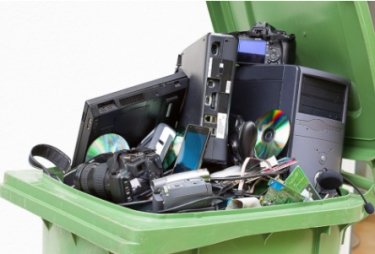1. Back Up and Erase Data
Before disposing of any electronic device, ensure all important data is backed up securely. Use cloud storage or external drives to save business-critical files. This step is especially crucial for businesses that handle client information or financial records.
Once you’ve backed up your data, erase all information from the device. For computers, use software like DBAN or built-in factory reset features to overwrite the hard drive. Mobile devices, including phones and tablets, usually have reset options in their settings menu. Simply deleting files isn’t enough; a full wipe ensures that data cannot be recovered by unauthorized individuals. Taking these precautions protects your company from potential data breaches or misuse of information.
2. Explore Local Recycling Programs
Recycling old electronics is one of the safest and most environmentally friendly disposal methods. Many communities offer e-waste recycling programs that partner with certified recyclers to handle electronics properly. Check with local government offices, electronics retailers, or waste management services to see if they provide free or low-cost recycling options.
Recycling helps prevent harmful substances like lead, cadmium, and mercury from entering the environment. Many recyclers will also dismantle your electronics and reuse valuable components.
3. Donate Electronics in Good Condition
If your business computers and electronics are still functional, donating them can be a fantastic option. Many nonprofit organizations, schools, and community centers accept older devices for reuse. Refurbished computers and tablets can support education, job training programs, and administrative tasks for charities that might not afford new equipment.
Before donating, double-check that the devices are in good working order. Be sure to wipe all data and restore the devices to factory settings. Some organizations may even offer assistance with refurbishing and distributing the equipment. Giving your electronics a second life not only reduces waste but also helps others in need.
4. Use Certified E-Waste Recyclers
For electronics that can’t be donated or reused, certified e-waste recyclers are the best solution. Look for certifications like R2 (Responsible Recycling) or e-Stewards, which indicate the recycler follows ethical practices. Certified recyclers ensure electronics are processed safely, separating hazardous materials and reclaiming usable components.
Many recyclers also offer pick-up services for businesses disposing of large quantities of equipment. If your business handles sensitive data, ask for a certificate of destruction. This document guarantees your data was securely destroyed during the recycling process. By choosing a certified recycler, you’ll comply with local laws and protect your business reputation.
5. Avoid Illegal Dumping or Selling Unsecurely
Disposing of electronics improperly—such as throwing them in the trash—can lead to environmental harm and hefty fines. Electronics often contain toxic materials, including heavy metals and chemicals, that require specialized handling. Many jurisdictions have strict laws prohibiting the disposal of e-waste in landfills.
Selling old devices is another option, but it comes with risks. Always vet buyers carefully, especially when selling electronics that once stored sensitive information. Unverified buyers may not dispose of the devices responsibly, or worse, they could recover data from improperly wiped equipment. Stick to trusted platforms or certified buyers for reselling used electronics.
Conclusion
Safely disposing of business computers and electronics is a responsibility every business should take seriously. Avoid shortcuts like illegal dumping or selling to unverified buyers, as they can lead to significant issues down the road.
Taking these steps protects your business, supports the environment, and ensures your electronics find a proper second life—or are safely recycled when they reach the end of their use.









































